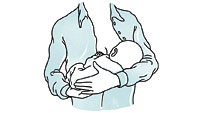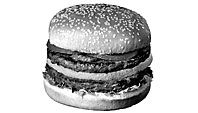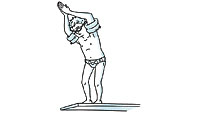In the aughts, the shocking hidden side of everything became the only side of anything worthy of magazine covers and book deals. Social scientists applied their techniques to the problem of climate change; liberals who wanted to be taken seriously had to come up with arguments for conservative policies and vice versa. Everywhere in the media, the former creators of mass consensus devoted themselves to contradicting the conventional wisdom. Here, a selection of the most unlikely ideas in a decade that was always looking to blow your mind.
Amateurs are better than experts.
2004, Book.
Disorganized crowds of people, so long as they have a diversity of experiences and viewpoints, make better decisions than individual experts.
JAMES SUROWIECKI, THE WISDOM OF CROWDS.

Ann Coulter should be a feminist icon.
2006, Website.
Female pundits as aggressive and funny as Coulter should be admired.
ELSPETH REEVE, “A DEFENSE OF ANN COULTER,” TNR.COM, AUGUST 16.
Boys are the biggest victims of sex discrimination.
2000, Book.
Girls are doing better in school than boys, but because feminists insist that girls are still an at-risk group, boys are now ignored and left to fail. Furthermore, teaching boys to be sensitive and empathetic is a mistake; what they really need is a father’s masculine presence, to instill a sense of honor and make them into “gentlemen.”
CHRISTINA HOFF SOMMERS, THE WAR AGAINST BOYS: HOW MISGUIDED FEMINISM IS HARMING OUR YOUNG MEN.
Being smart doesn’t help you get ahead.
2008, Book.
Studies prove that “deliberate practice” fueled by “furious hard work” contributes far more to success in almost every field than innate intelligence or talent.
MALCOLM GLADWELL, OUTLIERS: THE STORY OF SUCCESS.

Breast-feeding is not worth the trouble.
2009, Magazine.
The evidence for the superiority of breast-feeding is thin. Most of the studies fail to distinguish between correlation and causation, and the massive national obsession with the need to breast-feed reeks of classism.
HANNA ROSIN, “THE CASE AGAINST BREAST-FEEDING,” THE ATLANTIC, APRIL.
Bush’s second term will be good for liberals.
2004, Magazine.
In a second bush term, things will go so poorly that the media and the nation will turn against both him and republicans in general.
MICHAEL WOLFF, “WHAT IF BUSH WINS?” VANITY FAIR, OCTOBER.
Car seats are unsafe.
2009, Book.
Civilization should be destroyed.
2006, Book.
Civilization is unsustainable, and at its current size and complexity, it cannot be made sustainable. Participating in civilization makes you complicit in its violence, so it is a conscientious person’s duty to systematically dismantle and destroy civilization in order the save the planet.
DERRICK JENSEN, ENDGAME.
Consumption isn’t just good for the economy, it’s good for the soul.
2003, Book.
While some rail against the paralysis of consumer choice or find the commodification of identity unhealthy, being able to purchase one’s own “aesthetic identity” is liberating. The impulse to surround yourself with beauty and be beautiful yourself is natural and human, and capitalism makes more beauty more available to more people.
VIRGINIA POSTREL, THE SUBSTANCE OF STYLE: HOW THE RISE OF AESTHETIC VALUE IS REMAKING COMMERCE, CULTURE, AND CONSCIOUSNESS.
Conventional wisdom is right.
2001, Magazine.
While you may have read (hundreds of times in the very magazine this piece was being written in) that the conventional wisdom is wrong, it is actually usually right. It is “a broad agreement of elite opinion” and “a time-tested means of filtering out the bunk.” Attacks on the C.W. are vestiges of the New Left’s distrust of authority, and the consensus of wise, mainstream figures is reliable.
FRANKLIN FOER, “IN DEFENSE OF THE CONVENTIONAL WISDOM: WHY WHAT EVERYONE THINKS IS USUALLY RIGHT,” THE NEW REPUBLIC, MARCH 19.
Corporate fraud should not be punished.
2004, Magazine.
Prosecutions of prominent executives and CEOs may satiate public bloodlust but they distract from the necessity of real reform.
“THE CASE AGAINST THE PROSECUTION; AMERICA’S CORPORATE TRIALS,” THE ECONOMIST, FEBRUARY 28.
Creed is a good band.
2009, Website.
Creed irritated people only because its music was “so unabashedly calibrated toward pleasure.”
JONAH WEINER, “CREED IS GOOD,” SLATE, OCTOBER 21.
The crime drop didn’t happen because of better police work—or the economy.
2005, Book.
The only statistically proven causes of the nineties reduction in crime were increases in the size of police forces, increases in prison capacity, the end of battles over crack-dealing territory, and most importantly, the legalization of abortion—unwanted children are the ones most likely to commit crimes, and legalized abortion means fewer unwanted children.
STEVEN LEVITT AND STEPHEN DUBNER, FREAKONOMICS: A ROGUE ECONOMIST EXPLORES THE HIDDEN SIDE OF EVERYTHING.
Critically acclaimed authors are terrible.
2001, Magazine.
Almost every single widely praised contemporary author of fiction is a charlatan. The “cultural elite” wants us to believe that boring or fussy prose is good. Writers like Cormac McCarthy and Annie Proulx are too inaccessible.
B. R. MYERS, “A READER’S MANIFESTO,” THE ATLANTIC, JULY/AUGUST.
Cultural imperialism is good.
2002, Book.
What looks like the homogenization or Americanization of world culture is actually markets bringing people the culture they want. “Cross-cultural trade” (e.g., jazz exported to France, Persian rugs imported to America) is making local traditions more vibrant and relevant than ever.
TYLER COWEN, CREATIVE DESTRUCTION: HOW GLOBALIZATION IS CHANGING THE WORLD’S CULTURES.
Delaware is one of the country’s biggest problems.
2002, Magazine.
Delaware is a vast, corrupt, corporate scam of a state, and they are ripping us all off.
JONATHAN CHAIT, “ROGUE STATE: THE CASE AGAINST DELAWARE,” THE NEW REPUBLIC, AUGUST 19–26.
Drinking is good for you.
2007, Book.
Enjoying alcohol (in excess—“moderation” is the watchword of the joyless) is a pastime with an admirable history.
BARBARA HOLLAND, THE JOY OF DRINKING.
Drug dealers don’t make more money than poor people with “straight” jobs.
Despite its portrayal in popular culture as a way out of poverty and into a flashy ride, the average street dealer makes less than the minimum wage.
LEVITT AND DUBNER, FREAKONOMICS.
Drugs are good for you.
2003, Book.
The drug war is bad not just because it is immoral and impractical, but because drugs (and not just weed—the “serious” ones, too) are fun to do, and don’t have to be harmful. Many successful people engage in recreational drug use without destroying themselves.
JACOB SULLUM, SAYING YES: IN DEFENSE OF DRUG USE.
Drunk driving is safer than drunk walking.
If one assumes that the percentage of miles walked drunk each year is the same as the percentage of miles driven drunk, fatality statistics indicate you’re more likely to be killed while walking.
LEVITT AND DUBNER, SUPERFREAKONOMICS.

Evidence of Osama bin Laden’s guilt is irrelevant.
2001, Website.
Marshaling “evidence” that Osama bin Laden is responsible for 9/11 will only waste precious time we could be spending killing Osama bin Laden.
ROMESH RATNESAR, “THE CASE AGAINST A CASE,” TIME.COM, SEPTEMBER 26.
Exercise is bad for you.
2004, Magazine.

Fat doesn’t make you fat.
2007, Book.
It’s actually refined carbohydrates that are to blame for obesity and heart disease (and exercise doesn’t necessarily lead to weight loss).
GARY TAUBES, GOOD CALORIES, BAD CALORIES: CHALLENGING THE CONVENTIONAL WISDOM ON DIET, WEIGHT CONTROL, AND DISEASE.
Feminism is exploitative.
2004, Magazine.
Modern feminists are responsible for the subjugation of the working class (powerful working women need cheap labor to take care of household duties, like child-rearing).
CAITLIN FLANAGAN, “HOW SERFDOM SAVED THE WOMEN’S MOVEMENT,” THE ATLANTIC, MARCH.
Gay marriage is good for conservatives.
2003, Magazine.
Conservatives like it when people get married, because it makes people more conservative—so conservatives should like it even when gay people get married.
ANDREW SULLIVAN, “THE CONSERVATIVE CASE FOR GAY MARRIAGE,” TIME, JUNE 22.
Gay marriage oppresses gay people.
2009, Magazine.
An array of free-love-style social/sexual relations is far freer and more fun than repressive monogamous marriage.
MARK GREIF, “ON REPRESSIVE SENTIMENTALISM,” N+1, FALL.
Giving your product away is better business than selling it.
2009, Book.
Everything you produce should be free, because no one will pay for it anyway and it’s the last reliable way to build an audience (which will eventually help you turn a profit).
CHRIS ANDERSON, FREE: THE FUTURE OF A RADICAL PRICE.

Global warming isn’t a big deal.
Cutting emissions would prove way more difficult and probably be way less effective at battling climate change than technological solutions that will be easy to implement.
LEVITT AND DUBNER, SUPERFREAKONOMICS.
George W. Bush is a liberal.
2004, Website.
George W. Bush is a “utopian internationalist,” like liberal presidents such as Woodrow Wilson and FDR.
WILLIAM SALETAN, “BUSH THE LIBERAL,” SLATE, SEPTEMBER 21.
Google is hurting civilization.
2008, Magazine.
Because of Google, we cannot concentrate and we skim instead of read. “The result is to scatter our attention and diffuse our concentration.”
NICHOLAS CARR, “IS GOOGLE MAKING US STUPID?,” THE ATLANTIC, JULY/AUGUST. A YEAR LATER, THE ATLANTIC PUBLISHED AN ESSAY ABOUT HOW GOOGLE IS MAKING US SMARTER.
Government transparency is bad.
2009, Magazine.
Because the public cannot interpret or understand much of the data released by the government, transparency leads to wrong conclusions about actions and motivations of elected officials and civil servants. Learning which industries fund your senator can lead to harmful cynicism about the political process as a whole.
LAWRENCE LESSIG, “AGAINST TRANSPARENCY: THE PERILS OF OPENNESS IN GOVERNMENT,” THE NEW REPUBLIC, OCTOBER 9.
Impulsiveness is superior to careful consideration.
2005, Book.
You could spend a lot of time trying to reason through a decision, or you could just go with your gut, which research indicates is actually more reliable anyway.
MALCOLM GLADWELL, BLINK: THE POWER OF THINKING WITHOUT THINKING.

The Iraq War was a success.
2008, Website.
After 9/11, a battle against the forces of totalitarianism, with Saddam Hussein as Stalin, became morally imperative. The fact that all the talk of the imminent threat that Hussein presented was revealed to have been invented or exaggerated didn’t matter because the invasion was an intervention “on the right side and for the right reasons,” such as Iraq’s “latent” WMD capacity and Hussein’s “forwarding and aiding the merchants of suicide terror.” Furthermore, Bush’s 2002 U.N. speech (heavy with misrepresentations of U.N. findings on Iraq’s weapons programs) was “was easily the best speech of his two-term tenure.”
CHRISTOPHER HITCHENS, “HOW DID I GET IRAQ WRONG? I DIDN’T,” SLATE, MARCH 17.
Laziness should not disqualify one from being president.
2007, Magazine.
Fred Thompson is lazy, sure—but so were indisputably results-getting heads of state like Reagan and Churchill.
MICHAEL CROWLEY, “IDLE WORSHIP: IN PRAISE OF FRED THOMPSON’S LAZINESS,” THE NEW REPUBLIC, OCTOBER 22.
Nepotism is good.
2003, Book.
Heirs care passionately about the survival and strength of family-owned companies, and they are usually held to high standards.
ADAM BELLOW, IN PRAISE OF NEPOTISM: A NATURAL HISTORY.

New Orleans shouldn’t be rebuilt.
2005, Website.
The city will eventually be hit by a worse storm and it was already one of the most impoverished and dysfunctional cities in the nation.
JACK SHAFER “DON’T REFLOAT: THE CASE AGAINST REBUILDING THE SUNKEN CITY OF NEW ORLEANS,”SLATE, SEPTEMBER 7. THIS IDEA WAS SECONDED IN THE NEW REPUBLIC PIECE “SUNKEN COST,” BY ADAM B. KUSHNER THE FOLLOWING MONTH.
New ideas aren’t important in politics.
2005, Magazine.
Obesity is not an epidemic.
2004, Book.
Many fat people, as defined by the BMI standard, are actually healthier than many skinny people, who operate from an “anorexic mind-set”—the fat and active live longer than the thin and sedentary.
PAUL CAMPOS, THE OBESITY MYTH: WHY AMERICA’S OBSESSION WITH WEIGHT IS HAZARDOUS TO YOUR HEALTH.

Parental involvement in education is a waste.
Past a certain fairly low economic level, the advantages bestowed on one’s offspring by class status make things like reading to your child irrelevant. (Also, it’s more dangerous to have a swimming pool than to have a gun in your home.)
LEVITT AND DUBNER, FREAKONOMICS.
Pimps are good for prostitutes.
Pimps allow prostitutes to earn more with less risk than they would working on their own, by providing protection and a steady client base, and the commission they take is more reasonable than commissions taken by real-estate agents.
LEVITT AND DUBNER, SUPERFREAKONOMICS.
Plagiarism isn’t a big deal.
2004, Magazine.
We accept—and even reward—borrowing and outright theft in music (albeit sometimes without realizing it) because we acknowledge that creativity depends on influence and interpretation. But in prose, no one is allowed to borrow so much as a sentence, even if they recontextualize it. That’s petty, especially because not even the most original author writes without borrowing.
MALCOLM GLADWELL, “SOMETHING BORROWED,” THE NEW YORKER, NOVEMBER 22.
Politically motivated appointments aren’t so bad.
2005, Magazine.
Political appointees are usually more passionate and thus more active than career civil servants.
CHARLES PETERS, “THE CASE AGAINST THE CASE AGAINST POLITICAL APPOINTEES,” WASHINGTON MONTHLY, DECEMBER.
Racial profiling is unconservative.
2001, Magazine.
Targeted profiling and police harassment undermine the successful instillation of core conservative values (like individuality and respect for authority) in minorities.
JAMES FORMAN JR., “ARRESTED DEVELOPMENT: THE CONSERVATIVE CASE AGAINST RACIAL PROFILING,” THE NEW REPUBLIC, SEPTEMBER 10.

Radiohead isn’t a good band.
2009, Magazine.
A raging temper is a good quality in a politician.
2007, Magazine.
Ted Stevens’s incredible vindictiveness made him a uniquely talented and successful senator: his legendary temper kept colleagues in line, made potential enemies scared to challenge him, and steered $3 billion in federal money to Alaska.
MICHAEL CROWLEY, “THE JERK: IN PRAISE OF TED STEVENS, THE SENATE’S ANGRIEST MAN,” THE NEW REPUBLIC, SEPTEMBER 10.
Ralph Bellamy’s characters were good people.
2008, Magazine.
Bellamy was always the boring heel in screwball comedies (and always engaged to a woman who obviously needed to end up back with Cary Grant). But, unlike in modern romantic comedies, where the heroine leaves a cad for a good guy, Bellamy was usually playing a decent and good man who’d be better off without the heroine. (This is contrary to Pauline Kael, who dismissed him as the original “square.”)
MARK LOTTO, “IN PRAISE OF RALPH BELLAMY,” THE NEW YORK OBSERVER, OCTOBER 2.
Selling obscure things is better than selling popular things.
2006, Book.
As Amazon’s success indicates, blockbusters are less profitable than a deep catalogue of beloved obscurities.
CHRIS ANDERSON, THE LONG TAIL: WHY THE FUTURE OF BUSINESS IS SELLING LESS OF MORE.
Successful companies cannot be imitated.
2007, Book.
It’s almost impossible to imitate the success of successful companies because it’s too tough to distinguish the traits that make a company successful from the ones that didn’t contribute to, or that may have even impeded, that success.
PHIL ROSENZWEIG, THE HALO EFFECT … AND THE EIGHT OTHER BUSINESS DELUSIONS THAT DECEIVE MANAGERS.
Watching TV and playing video games make kids smarter.
2005, Book.
Modern video games (which involve complex problem-solving) and increasingly complicated television shows improve children’s critical thinking skills.
STEVEN JOHNSON, EVERYTHING BAD IS GOOD FOR YOU: HOW TODAY’S POPULAR CULTURE IS ACTUALLY MAKING US SMARTER.